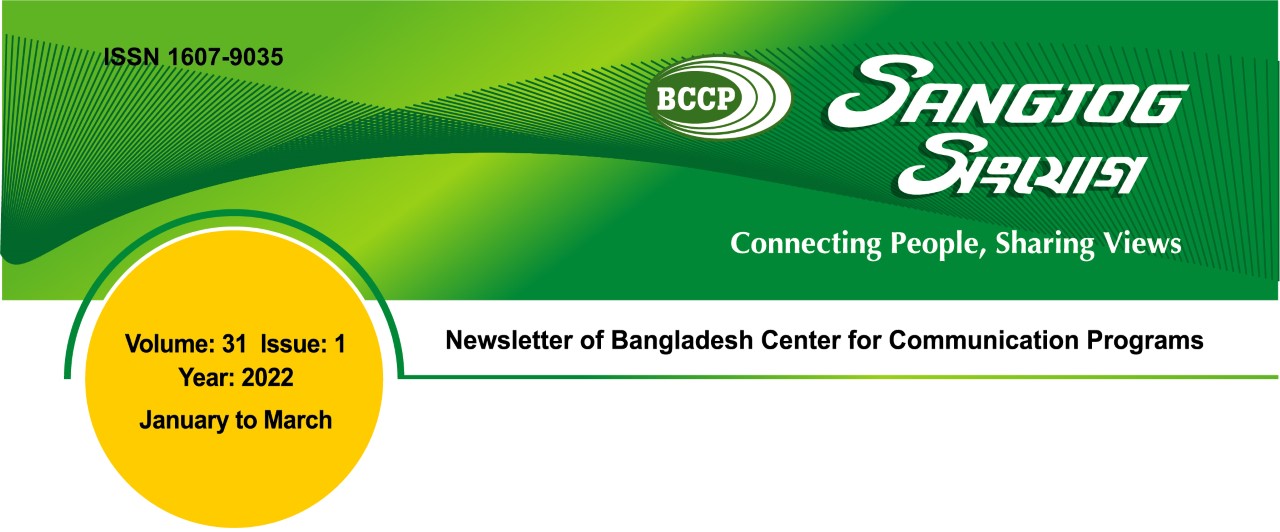
FOCUS DEMANDS SACRIFICE
Main Article
Communication Process and Behavior Change
In the past few decades, development communication has evolved from Information, Education and Communication (IEC) to Behavior Change Communication (BCC) to Social and Behavior Change Communication (SBCC). IEC as it was usually practiced focused on delivering information to a target, with the assumption that given accurate information people would reduce damaging behaviors and adopt healthy behaviors. BCC acknowledged that information is necessary but not sufficient in most cases. BCC uses context-specific formative research to determine the motivators, barriers and facilitators to behavior change, and responds with a variety of techniques designed to incite the individual to change his or her behavior. SBCC expands BCC, explicitly recognizing the importance of changing social norms and increasing social support for behavior change, and acknowledging that change at the individual level occurs within the concentric circles of influence of family, community and society.
Current, successful behavior change interventions are built on an understanding of the complex social, cultural and economic factors that make up the multiple levels of determinants of health and health behavior. Eight factors that best explain and predict behavior include:
• Intention to perform the behavior
• Environmental or external constraints and barriers
• Skills needed to perform the behavior
• Attitude or belief that the benefits of the behavior outweigh the risks or costs
• Perceived social or normative pressure
• Self-image
• Emotional reaction
• Self-efficacy (a person’s confidence in her ability to take action and maintain a behavior)
Behaviors are generally classified as habitual, normative, and preventive. Habitual behaviors are performed without much thought; normative behaviors are based on powerful forces of traditional and social approval; and preventive behaviors may lack a salient, immediate outcome. Also, complex behaviors are more difficult to change than simple ones, and adopting new behaviors, or replacing old behaviors with new ones, is generally easier than prompting someone to stop doing (or avoid starting) an unhealthy or undesirable behavior. New habitual behaviors that require fundamental changes in routines are more difficult to change than one-off behaviors.
Social norms and pressures have a major influence on behavior, and this is key not just in initiating behavior,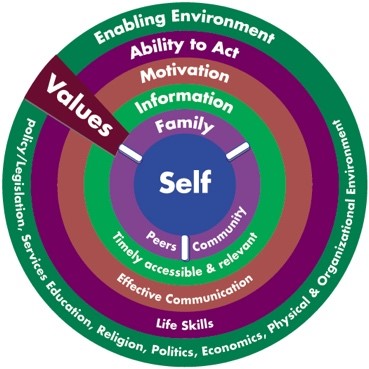 but also for reinforcing it through feedback that makes successes visible and supports maintenance of the behavior. Appeals to the heart as well as the mind. The idea that SBCC should appeal to emotions would seem to
flow naturally from the idea that purely informational approaches are insufficient, but it is surprisingly absent in many interventions. In general, the less willing and able the audience is to change, the more the intervention has to be creative, entertaining, and emotive.
but also for reinforcing it through feedback that makes successes visible and supports maintenance of the behavior. Appeals to the heart as well as the mind. The idea that SBCC should appeal to emotions would seem to
flow naturally from the idea that purely informational approaches are insufficient, but it is surprisingly absent in many interventions. In general, the less willing and able the audience is to change, the more the intervention has to be creative, entertaining, and emotive.
Strategic Communication
Strategic communication is a term used to describe the communication principles, strategies, and initiatives used to further an organization’s goals, mission, or values. It is a multidisciplinary professional field, drawing upon communication practices found in related disciplines, including public relations, mass communication, advertising, and organizational communication. Strategic communication can mean either communicating a concept, a process, or data that satisfies a long term strategic goal of an organization by allowing facilitation of advanced planning, or communicating through various media/channels to coordinate actions and activities of operationally significant social, commercial or corporate field.
Strategic Communication emphasize on 5 key components
• Determine audience’s current state of behavior thru Behavior Change Steps process.
• Identify and profile audience.
• Select appropriate communication channel.
• Develop message, material and activities.
• Plan for monitoring and evaluation.
Communication and perception
Perception is awareness, comprehension or an understanding of something. An example of perception is knowing when to try a different technique with a student to increase their learning. A person's past experience plays a big role in shaping their perception of communication. This is vital to understand in a business environment because it will affect whether or not your customers want to receive services or buy from you. Perception's effect on the communication process is all about how the same message can be interpreted differently by different people. Perception issues in workplace communication can lead to a number of distortions, which are biases or judgments of others. This is where problems in communication can develop.
The Perception Process
Perception and communication are tightly linked. While communicating with others, perception follows a three-step process:
1. Selection
2. Organization
3. Interpretation
Types of Perception
There are four main factors that affect how perception varies between people:
• Physiology
• Past experiences
• Culture
• Present feelings.
Hierarchy-of-effects in communication:
Communication has different effects on different individuals. Some people are inspired to learn new ideas, 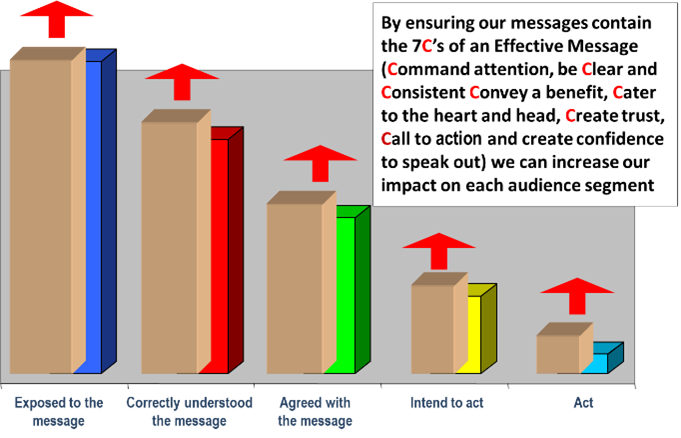 while others take action to change their behavior. This phenomenon is known as the Hierarchy of Effects. In the social communication field; it refers with exposure to a message, correct understanding of the message, agreement with that message, intention to change one’s behavior and taking of action.
while others take action to change their behavior. This phenomenon is known as the Hierarchy of Effects. In the social communication field; it refers with exposure to a message, correct understanding of the message, agreement with that message, intention to change one’s behavior and taking of action.
BCCP News
BCCP’s diverged area of work have been expanded and received recent assignments on the climate change, mental health, solar energy system and renewable energy
WHO CC&H: Learning and coping up with climate change's impact on health
BCCP has been awarded an 8-month program for “Training Need Assessment, Manual Development and Conduction of TOT for Health Sector Personnel on Climate Change and Health” by The World Health Organization (WHO). Led by prominent Public Health Expert Dr. Harun Ar Rashid, the assigned team will collect and analyze training documents related to Climate Change & Health; also conduct and develop tools for Key Informant Interview (KII) and Focus Group Discussion (FGD) at the national and local level. The team will develop training manuals and conduct training of trainers (TOT) to health professionals from the Directorate General of Health Services (DGHS) on Climate Change and Health.
Transform: Improving access to mental health care in slums
Another assignment was awarded for a 4-Year project on “Supporting the TRANSFORM Project through Community Engagement Activities and Development of Communication Materials” by Telepsychiatry Research and Innovation Network Ltd. (TRIN) under the funding of National Institute for Health Research (NIHR), UK. The objective of this project is to create awareness about mental health in slums among related stakeholders, reduce the stigma around it and to enable discussion on mental health issues in slum and in general at relevant platforms to ensure access to care for serious mental disorders in slums.
IDCOL: Create mass awareness on promotion of Rooftop Solar System
A project assignment has been awarded to BCCP for promoting Solar Rooftop System to ensure visibility among the industrialists and potential project sponsors through print, electronic and social media under an agreement with Infrastructure Development Company Limited (IDCOL).
IDCOL a government owned non-bank financial institution (NBFI) is pioneer in financing renewable energy projects, infrastructure project and energy efficient equipment. The company is the market leader in private sector renewable energy and infrastructure financing in Bangladesh.
(REEEP) II: Evaluation of Awareness Campaign Activities of Renewable Energy and Energy Efficiency Program (REEEP) II
BCCP signed a contract with The Deutsche Gesellschaft für Internationale Zusammenarbeit (GIZ) GmbH to provide technical assistance to a national survey on the impact of awareness campaign activities conducted under the leadership of Sustainable and Renewable Energy Development Authority (SREDA).
REEEP II is a bilateral technical cooperation project between the German and the Bangladesh Government, supported by the Bangladesh Ministry of Power, Energy and Mineral Resources (MPEMR) and implemented by GIZ. During implementation, REEEP II provided technical support to SREDA in developing a National Energy Efficiency and Conservation Awareness Campaign Concept and in designing and carry out several awareness activities nationwide.
A widespread GO-NGO coordination on HPN issues becomes visible in the BCCWG meeting
Visibility of GO-NGO coordination in the Health, Population and Nutrition (HPN) field became very widespread as the Behavior Change Communication Working Group (BCCWG) met its 33rd meeting held on March 31, 2022 in the IPHN conference room.
This meeting was chaired by Mr. Sayed Mujibul Huq, Additional Secretary, 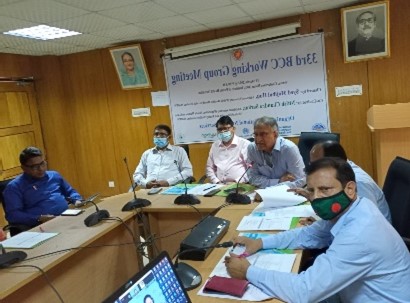 Health Service Division, MoHFW while Mr. Nitish Chandra Sarker, Additional Secretary, Medical Education & Family Welfare Division, MoHFW was present as co-chair. Mr. Jashim Udin Khan, Deputy Secretary (PH), Health Service Division, MoHFW also attended the meeting. Attending unit heads in this meeting were Dr. S M Mustafizur Rahman, LD-NNS; Prof. Dr. Nasiruddin Ahmed, Director-IPHN; and Dr. Mizanur Rahman Arif, LD-LHE&P.
Health Service Division, MoHFW while Mr. Nitish Chandra Sarker, Additional Secretary, Medical Education & Family Welfare Division, MoHFW was present as co-chair. Mr. Jashim Udin Khan, Deputy Secretary (PH), Health Service Division, MoHFW also attended the meeting. Attending unit heads in this meeting were Dr. S M Mustafizur Rahman, LD-NNS; Prof. Dr. Nasiruddin Ahmed, Director-IPHN; and Dr. Mizanur Rahman Arif, LD-LHE&P.
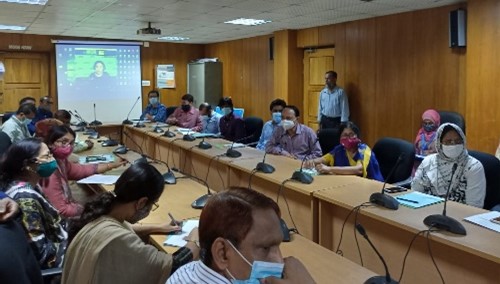 A number of 39 participants represents the GoB HPN units and the NGOs working in the HPN fields participated the meeting. The participating GoB units from DGHS include; LHEP, BHE, PHC, IPHN, MNCAH, NTP and NNS while the DGFP units include; FSD and IEM. NGO participations were made from Sukhi Jibon, Breastfeeding Foundation, Caritas, BBC Media Action, Eminence, Ujjiban, Sisimpur, SMC, WASUP, Nutritional International and Aporajeyo-Bangladesh.
A number of 39 participants represents the GoB HPN units and the NGOs working in the HPN fields participated the meeting. The participating GoB units from DGHS include; LHEP, BHE, PHC, IPHN, MNCAH, NTP and NNS while the DGFP units include; FSD and IEM. NGO participations were made from Sukhi Jibon, Breastfeeding Foundation, Caritas, BBC Media Action, Eminence, Ujjiban, Sisimpur, SMC, WASUP, Nutritional International and Aporajeyo-Bangladesh.
In course of reviewing the minutes of the last meeting Mr. Sayed Mujibul Huq pointed out about the progress of the production of SHPNE package book followed by the ToT for the HQ and field level officials. Mr. Jashim Udin Khan also pointed out an issue of the activation of District and Upazila level SBCC Coordination Committees. They have mentioned about the importance of the implementation of SHPNE package and activation of SBCC Coordination Committees in a planned basis.
As usual part of the meeting an organization wise presentation, in order to highlight replicable interventions and avoid duplication, were made by six organizations. The key activities highlighted by the organizations were:
Sukhi Jibon
- Greetings and orientation meeting with Newly Wed Couple have been initiated
- Male engagement for FP decision making has been re-initiated
- Capacity building for the DGFP call center’s call receivers conducted.
BHE
- Training on communicable disease and non- communicable Disease conducted in 35 districts
- BCC monitoring using SAMCS tool in selected upazila is continuing
- Service delivery package on communicable disease and non- communicable disease have been outsourced.
Breastfeeding Foundation
- Improvement of Maternal and Child Nutrition through formation of Mother Support Group (MSG)
- Promotion of home-based complementary feeding through courtyard meetings
- Online video call counseling on breastfeeding and complementary feeding.
DGFP
- eResource training is continuing
- Orientation on School Health Population Education Nutrition Package
- Family Welfare Service & Campaign Week 2021 conducted
- Orientation on Premarital Counseling.
Caritas
- Demonstrate cooking of nutritious food made in the community
- Community level demonstration of hand washing brings at the practice level
- Community level promotion of the TT vaccination for the adolescent.
NNS
- 21 live TV talk show broadcast from BTV on different aspects of nutrition
- 22 episodes of live phone-in program broadcast from BTV on different aspects of nutrition
- An updated version of IYCF brochure developed and distributed
- Observation of World Breastfeeding Week were made throughout 64 districts.
In the conclusion Mr. Nitish Chandra Sarker further reiterated the importance of rolling out of the SHPNE package implementation at the school level and urge upon the GoB units and NGOs to expediate the process of production of the package book and arrangements of ToT. He also emphasized on the activation of the SBCC Coordination committees at the district and upazila level.
The National Steering Committee continues with policy support and coordination for HPN SBCC programs
In implementation of SBCC approaches and interventions for the Health, Population and Nutrition field following the Comprehensive SBCC strategy, the national level policy support and coordination getting continued through the National Steering Committee. Some epoch-making policy support and coordination through this committee were evidential in formation of a 5-tier HPN SBCC Coordination committee at the ministry, directorate, division, district and upazila level; introducing OSMA apps for online SBCC material submission and approval system; design, development and introduction of School Health, Population and Nutrition Education Package; and design, development and implementation of the cascaded model of Leadership and Coordination curriculum.
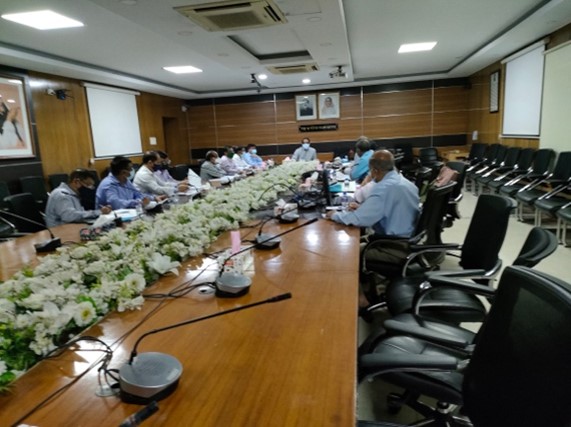 This committee met in its 3rd round of meeting on March 27, 2022 held in the MoHFW conference room. Presided over by the Chairperson of this committee Mr. Lokman Hossain Miah, Senior Secretary, HSD, MoHFW; this meeting among others was also attended by the Additional Secretaries from the HSD and ME&FWD, MoHFW, Joint Secretary, MoE and the Line Directors of IEM and NNS. The member-secretary of this committee Mr. M Jashimuddin Khan conducted the course of the meeting.
This committee met in its 3rd round of meeting on March 27, 2022 held in the MoHFW conference room. Presided over by the Chairperson of this committee Mr. Lokman Hossain Miah, Senior Secretary, HSD, MoHFW; this meeting among others was also attended by the Additional Secretaries from the HSD and ME&FWD, MoHFW, Joint Secretary, MoE and the Line Directors of IEM and NNS. The member-secretary of this committee Mr. M Jashimuddin Khan conducted the course of the meeting.
Key decisions of the meeting are underlined as;
- The progresses and the implementation status following the decisions of the 2nd meeting of the Steering Committee has been quite satisfactory.
- A fresh sub-committee has been formed to review the ToR of the LGRD&C to work in the city corporation and municipal areas on HPN programs. Mr. Nitish Chandra Sarker, Additional Secretary, ME&FWD of the MoHFW have been made Convener of this 5-member committee.
- The Annual HPN SBCC Monitoring Report 2019-2020 and its publication has been approved
PMC guidebook further introduced with 28 more upazila
After first level introduction of Pre-marital Counselling (PMC) guidebook in 12 upazila of 4 districts, DGFP initiated the second level introduction in 28 upazila across different district of the country. 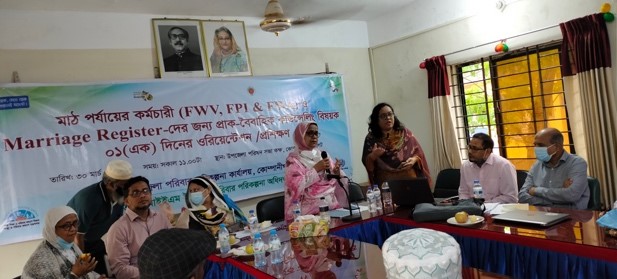 As part of the second level introduction of PMC guidebook, the Companiganj upazila have its orientation program on March 30, 2022 held in the upazila conference hall. A total of 34 participants represents the groups of Marriage Registrar, priest and field level cadres of FPI, FWV, FWA and PPV participated the orientation session. Ujjiban SBCC project is continuously providing technical assistance for this intervention to the IEM of DGFP.
As part of the second level introduction of PMC guidebook, the Companiganj upazila have its orientation program on March 30, 2022 held in the upazila conference hall. A total of 34 participants represents the groups of Marriage Registrar, priest and field level cadres of FPI, FWV, FWA and PPV participated the orientation session. Ujjiban SBCC project is continuously providing technical assistance for this intervention to the IEM of DGFP.
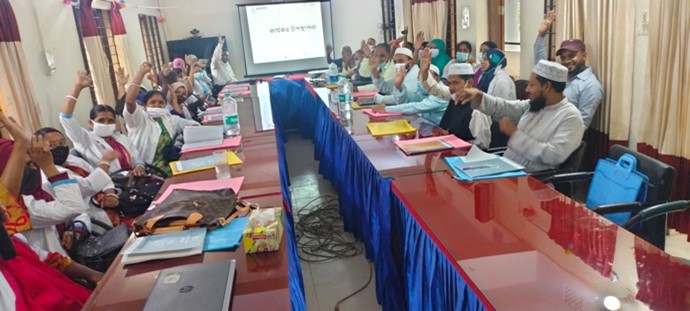 The inaugural session of the orientation program was attended by the Companiganj Upazila Nirbahi Officer Mr. Luci Kanto Hajong, DDFP Sylhet Dr. Lutfunnessa Jesmin, IEM’s Deputy Director Ms. Asma Hassan and Ms. Shahnaz Parveen.
The inaugural session of the orientation program was attended by the Companiganj Upazila Nirbahi Officer Mr. Luci Kanto Hajong, DDFP Sylhet Dr. Lutfunnessa Jesmin, IEM’s Deputy Director Ms. Asma Hassan and Ms. Shahnaz Parveen.
It is envisaged that the PMC guidebook will profusely contributing to carry on appropriate Family Planning and Reproductive Health messages and encourage about model health practice to the youths of the locality.
SHPNE Package have been a groundbreaking effort for a uniform, integrated and comprehensive school health curriculum
- Mr. Sayed Mujibul Haque Additional Secretary (PH), FSD, MoHFW
The School Health, Population and Nutrition Education (SHPNE) package have been introduced with the national level NGOs and with the City Corporations for field level implementation including the city/municipal areas in their respective School Health Education programs. This introduction made through a 3-day ToT held on March 22-24, 2022.
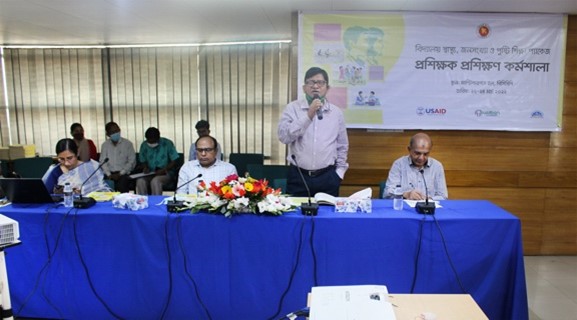 22 participants from 19 NGOs and Dhaka North and South city corporations attended this 3-day long course. Mr. Sayed Mujibul Haque Additional Secretary (PH), FSD, MoHFW inaugurated this course and mentioned this SHPNE Package as have been a groundbreaking effort for a uniform, integrated and comprehensive school health curriculum that will replace the entire existing HPN issue-based curriculums. Mr. M Jasimuddin Khan, Deputy Secretary (PH-2), FSD of the MoHFW, who is the Member-Secretary of the SHPNE package development committee, also spoke on the occasion.
22 participants from 19 NGOs and Dhaka North and South city corporations attended this 3-day long course. Mr. Sayed Mujibul Haque Additional Secretary (PH), FSD, MoHFW inaugurated this course and mentioned this SHPNE Package as have been a groundbreaking effort for a uniform, integrated and comprehensive school health curriculum that will replace the entire existing HPN issue-based curriculums. Mr. M Jasimuddin Khan, Deputy Secretary (PH-2), FSD of the MoHFW, who is the Member-Secretary of the SHPNE package development committee, also spoke on the occasion.
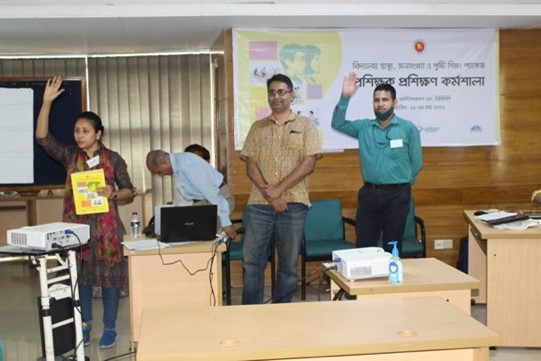 Course methodology
Course methodology
A combined form of methodologies has been adopted in the ToT courses that includes; graphical presentations, open discussions, brainstorming, group exercise, role play, experience sharing and energizers. These methodologies have been drawn in a way so that the same process could have followed for the end level trainers in the program field.
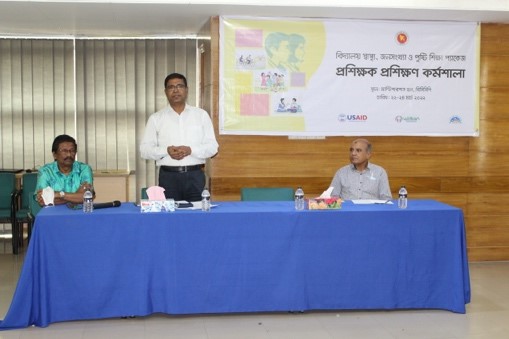 The closing ceremony was attended as Chief Guest by Mr. Nitish Chandra Sarker, Additional Secretary, ME and FWD of the MoHFW. Mr. Nitish Chandra Sarker underscored the need of introducing the SHPNE package in the NGO intervention areas along with municipal and City Corporation areas, especially those are having school health education programs. He also hoped that the successful implementation of the SHPNE package through GoB and NGO effort will bring a sustainable impact attaining Bangladesh’s goal on Health for All.
The closing ceremony was attended as Chief Guest by Mr. Nitish Chandra Sarker, Additional Secretary, ME and FWD of the MoHFW. Mr. Nitish Chandra Sarker underscored the need of introducing the SHPNE package in the NGO intervention areas along with municipal and City Corporation areas, especially those are having school health education programs. He also hoped that the successful implementation of the SHPNE package through GoB and NGO effort will bring a sustainable impact attaining Bangladesh’s goal on Health for All.
The School Health, Population and Nutrition Education package launched owing to a sustainable health system in Bangladesh through preventable health practices
A widespread hope for a sustainable health system in Bangladesh through preventable health practices were surrounds throughout the launching events of the School Health, Population and Nutrition Education package took place in the CIRDAP auditorium hall on January 06, 2021. This event also had a wider participation of the senior officials from the directorates of Health and Family Planning, Development Partners and NGOs.
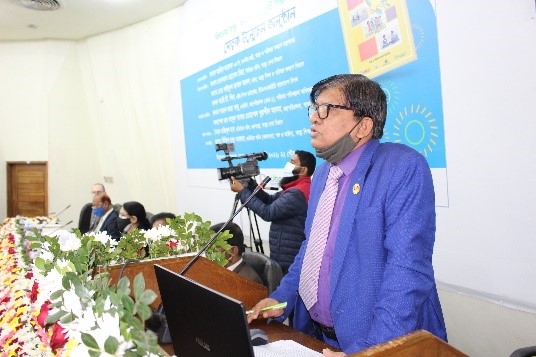 Presided over by Mr. Nitish Chandra Sarker, Additional Secretary (Pop., FW & Law), ME&FWD of the MoHFW the launching event was also attended as special guest by Mr. Shahadat Hossain, Additional Secretary (Dev.), ME&FWD, MoHFW; Ms. Shahan Ara Banu, Director General, Directorate of Family Planning, Mr. Md. Shahjahan, Director General, NIPORT and Mr. Barry T. Gill, Acting Mission Director, USAID-Bangladesh while the address of welcome was accorded by Mr. Syed Mojibul Hoq, Additional Secretary (PH), HSD of the MoHFW.
Presided over by Mr. Nitish Chandra Sarker, Additional Secretary (Pop., FW & Law), ME&FWD of the MoHFW the launching event was also attended as special guest by Mr. Shahadat Hossain, Additional Secretary (Dev.), ME&FWD, MoHFW; Ms. Shahan Ara Banu, Director General, Directorate of Family Planning, Mr. Md. Shahjahan, Director General, NIPORT and Mr. Barry T. Gill, Acting Mission Director, USAID-Bangladesh while the address of welcome was accorded by Mr. Syed Mojibul Hoq, Additional Secretary (PH), HSD of the MoHFW.
In his speech, as part of address of welcome, Mr. Syed Mojibul Hoq made a brief background of the development of the School Health, Population and Nutrition Education (SHPNE) package. 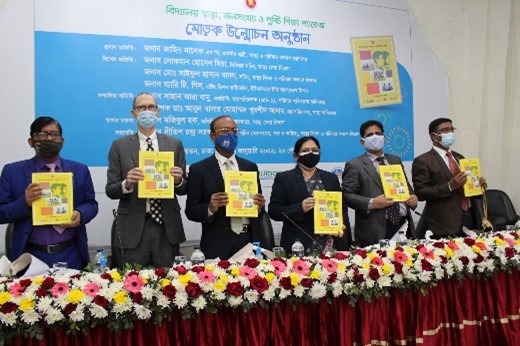 He optimized that this will contribute school boys and girls to become responsible father and mother. Before the special guests makes their speeches, Mr. Dipak Kanti Mazumder and Dr. Zeenat Sultana of Ujjiban made an overview respectively on the SHPNE package contents and its implementation plan in the field/school level. At this level of discussion two of the field level implementors, one each from the Health and family planning department, expressed their views over the SHPNE package and their field level experiences. Both of them talked about their hopefulness of addressing preventive health services for the school students to become more organized and user-friendly as this package covered comprehensive HPN issues and sessions have been planned with detail trainers note with a separate trainer’s guideline.
He optimized that this will contribute school boys and girls to become responsible father and mother. Before the special guests makes their speeches, Mr. Dipak Kanti Mazumder and Dr. Zeenat Sultana of Ujjiban made an overview respectively on the SHPNE package contents and its implementation plan in the field/school level. At this level of discussion two of the field level implementors, one each from the Health and family planning department, expressed their views over the SHPNE package and their field level experiences. Both of them talked about their hopefulness of addressing preventive health services for the school students to become more organized and user-friendly as this package covered comprehensive HPN issues and sessions have been planned with detail trainers note with a separate trainer’s guideline.
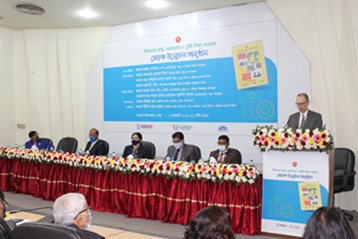 While addressing the occasion Mr. Md. Shahjahan, Director General, NIPORT termed the development of this package as very timely and to be contributory for the sustainable health of the country. Ms. Shahan Ara Banu highlighted the coverage of comprehensive health, population and nutrition issues in this package which will be uniformly provided both by the health and family planning front line workers. In his speech Mr. Barry T. Gill mentioned about USAID’s support for Bangladesh’s health development program. He hoped this package will contribute a lot for the adolescent as well as overall health situation of the country. Mr. Shahadat Hossain reiterated the combination of HPN issues in one package which has been provided with detail notes and guideline has enriched this package will become very useful for the school students.
While addressing the occasion Mr. Md. Shahjahan, Director General, NIPORT termed the development of this package as very timely and to be contributory for the sustainable health of the country. Ms. Shahan Ara Banu highlighted the coverage of comprehensive health, population and nutrition issues in this package which will be uniformly provided both by the health and family planning front line workers. In his speech Mr. Barry T. Gill mentioned about USAID’s support for Bangladesh’s health development program. He hoped this package will contribute a lot for the adolescent as well as overall health situation of the country. Mr. Shahadat Hossain reiterated the combination of HPN issues in one package which has been provided with detail notes and guideline has enriched this package will become very useful for the school students.
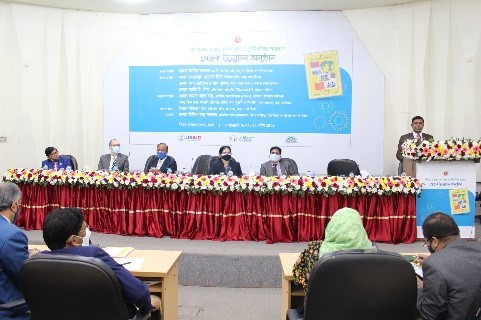 In his concluding remarks as Chairperson Mr. Nitish Chandra Sarker mentioned about the usefulness of this package by extending reach and coverage and avoiding duplication in the field as it will implement under a joint planning in the field. He expressed hopes that this package will bring about the model health behavior as community practice.
In his concluding remarks as Chairperson Mr. Nitish Chandra Sarker mentioned about the usefulness of this package by extending reach and coverage and avoiding duplication in the field as it will implement under a joint planning in the field. He expressed hopes that this package will bring about the model health behavior as community practice.
The event had a good coverage in the national print and electronic media that highlighted the main features of the occasion. These mass media include The New Nation (Print), Channel-i, Masranga, and Mohna (Electronic).
SHPNE package got started with gradual rolling out in the field following the divisional level orientation in Sylhet
A day-long orientation for the GoB and NGO officials working in the HPN field initiated with the gradual rolling out of the School Health, Population and Nutrition Education (SHPNE) Package in the field through divisional level orientation in Sylhet. The USAID-Ujjiban SBCC Project provided technical assistance in organizing and facilitating the orientation program.
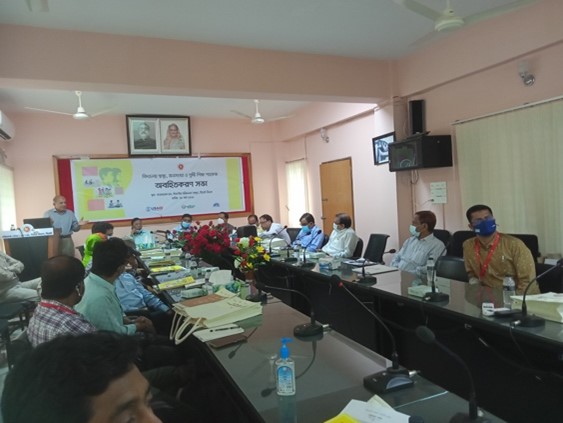 This orientation was held on March 28, 2022 in the conference hall of the office of the Divisional Director-Health, Sylhet. The HPN GoB officials of Sylhet attended this meeting were the Divisional Director
(Health), Divisional Director-Family Planning, Director-DIO, Deputy Director-Social Service, Deputy Director-Family planning, Deputy Civil Surgeon, Assistant Director-Health, Medical Officer-Health, Senior Health Education Officer and Inspector of School-Secondary & Higher Education. While NGOs attended this meeting includes; BRAC, Pathfinder, Save the Children, SUCHONA, Save the Children, FIVDB, CNRS, IDEA, FPAB, WHO and Ujjiban SBCC Project.
This orientation was held on March 28, 2022 in the conference hall of the office of the Divisional Director-Health, Sylhet. The HPN GoB officials of Sylhet attended this meeting were the Divisional Director
(Health), Divisional Director-Family Planning, Director-DIO, Deputy Director-Social Service, Deputy Director-Family planning, Deputy Civil Surgeon, Assistant Director-Health, Medical Officer-Health, Senior Health Education Officer and Inspector of School-Secondary & Higher Education. While NGOs attended this meeting includes; BRAC, Pathfinder, Save the Children, SUCHONA, Save the Children, FIVDB, CNRS, IDEA, FPAB, WHO and Ujjiban SBCC Project.
Mr. Nitish Chandra Sarker, Additional Secretary, ME&FW, MoHFW and the Convenor of the National Committee for an Integrated, Unified and Uniform SHPNE Package attended the meeting as Chief Guest. The Member-Secretary of this National Committee Mr. M Jashimuddin khan, DS, HSD, MoHFW also attended this orientation program and facilitate sessions.
There was a good level of interactions took place in the orientation program with the power point presentation, question-answer and open discussion. Out of the discussions following key recommendations were taken for considerations to get pursued and accommodate the suggested corrections in the next edition of this package:
- A letter from the ministry of education on their approval for this SHPNE Package to introduce in the schools as extra-curricular activities and permit schools to facilitate conduction of this orientation programs.
- Include District and Upazila officers of primary and secondary levels in the Upazila and District SBCC Coordination Committees to involve them in the planning and implementation process of the SHPNE Package orientation in the schools.
- At least one teacher from each of the schools should be brought in the field level training to be organized for the front-line supervisors of the Health and Family Planning Directorates.
- Provide handouts to the attendee students on the topic they got orientation to help them memorizing the contents of the topic.
- One set of package book be provided to the school library as reference materials.
- Few images of the package may require to re-designing for bringing appropriate senses of the topic.
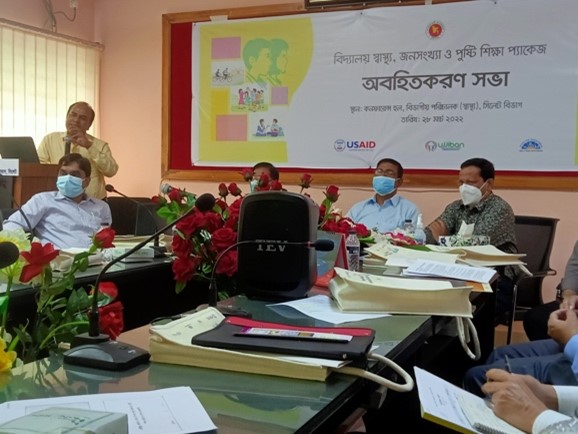 In his concluding remarks the Chief Guest mentioned the SHPNE Package as a remarkable step towards attaining the sustainable health of Bangladesh. He, however, reminded the GoB officials about the importance of integrated planning at the field for the school level orientation. He thanked the participants of this orientation program for their active participation and hoped that the field level planning and implementation of the SHPNE Package for the school level orientation will start soon.
In his concluding remarks the Chief Guest mentioned the SHPNE Package as a remarkable step towards attaining the sustainable health of Bangladesh. He, however, reminded the GoB officials about the importance of integrated planning at the field for the school level orientation. He thanked the participants of this orientation program for their active participation and hoped that the field level planning and implementation of the SHPNE Package for the school level orientation will start soon.
Roll out of SHPNEP in the field following a day long divisional level orientation meeting in Chittagong
A divisional level orientation on the School Health, Population & Nutrition Education Package for Chittagong division was held on 30 March 2022 in the conference room of the Divisional Director, Health, Chittagong attended by the GoB and CSO stakeholders of the Chittagong Division.
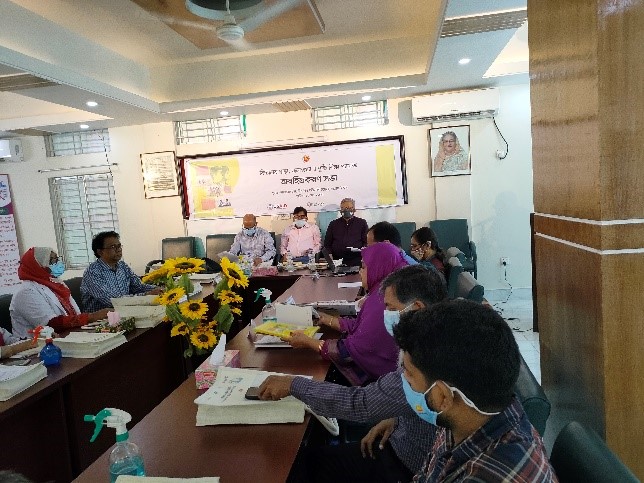 The orientation meeting was presided over by Dr. Hasan Shahrier Kabir, Divisional Director-Health, Chittagong and Co-Chaired by Mr. Md. Habibur Rahman Khan, Joint Secretary & Divisional Director, Family Planning while Syed Mojibul Huq, Additional Secretary (Public Health), Health Services Division and the Chair of the National Implementation & Monitoring Committee for HPN SBCC Strategy were present as the Chief Guest. Dr. Md. Shakhawat Ullah, Deputy Director, Health, Assistant Director (Admin) and Deputy Director, Family Planning, Chittagong also present in the meeting. The orientation meeting was organized and facilitated with the technical assistance from USAID-Ujjiban SBCC Project provided.
The orientation meeting was presided over by Dr. Hasan Shahrier Kabir, Divisional Director-Health, Chittagong and Co-Chaired by Mr. Md. Habibur Rahman Khan, Joint Secretary & Divisional Director, Family Planning while Syed Mojibul Huq, Additional Secretary (Public Health), Health Services Division and the Chair of the National Implementation & Monitoring Committee for HPN SBCC Strategy were present as the Chief Guest. Dr. Md. Shakhawat Ullah, Deputy Director, Health, Assistant Director (Admin) and Deputy Director, Family Planning, Chittagong also present in the meeting. The orientation meeting was organized and facilitated with the technical assistance from USAID-Ujjiban SBCC Project provided.
Assistant Director, Family Planning, Assistant Director, Port Clearance, Representative from Secondary Education, Social Welfare, Information, Assistant Director-Health, Medical Officer-Family Planning and Senior Health Education Officer were attended as GoB Officals While CSOs attended this meeting includes BRAC, Shukhijibon, Save the Children, YPSA, UTSA, Mamata, World Vision, CARITAS, OPCA, Surjer Hashi and Ujjiban SBCC Project.
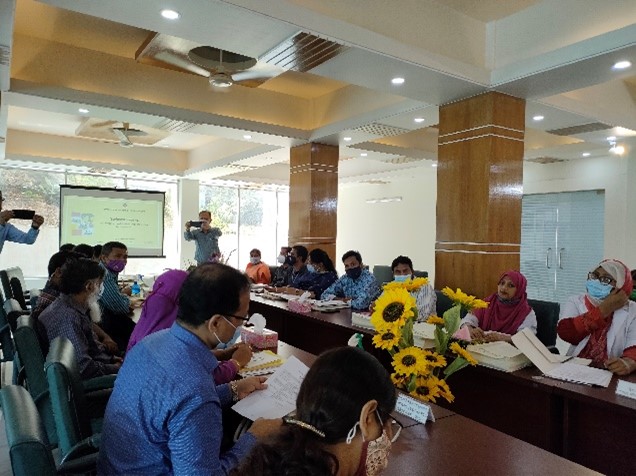 The orientation meeting was facilitated by Dr. Zeenat Sultana, Deputy Chief of Party and Mr. Dipak Kanti Mazumder, Senior Communication Specialist, USAID-Ujjiban SBCC Project with the power point presentation in four sections i.e., background, introduction of SHPNEP, Guideline for Service Provider and Implementation Plan of the package. The SHPNE Package accepted by the audience unanimously. After the presentation threadbare discussion was held during question-answer and open discussion, where the following key recommendations were taken for considerations to get pursued and accommodate the suggested corrections in the next edition of this package:
The orientation meeting was facilitated by Dr. Zeenat Sultana, Deputy Chief of Party and Mr. Dipak Kanti Mazumder, Senior Communication Specialist, USAID-Ujjiban SBCC Project with the power point presentation in four sections i.e., background, introduction of SHPNEP, Guideline for Service Provider and Implementation Plan of the package. The SHPNE Package accepted by the audience unanimously. After the presentation threadbare discussion was held during question-answer and open discussion, where the following key recommendations were taken for considerations to get pursued and accommodate the suggested corrections in the next edition of this package:
- Few illustrations recommended for re-designing for bringing appropriate senses of the topic
- Involvement of guardian and School Management Committee for better utilization of this package
- A set of package book be provided to the school library as reference materials
- Include District and Upazila officers of primary and secondary levels in the Upazila and District HPN SBCC Coordination Committees to involve them in the planning and implementation process of the SHPNE Package orientation in the schools.
- At least one teacher from each of the schools should be brought in the field level training to be organized for the front-line supervisors of the Health and Family Planning Directorates.
- Provide handouts to the attendee students on the topic they got orientation to help them memorizing the contents of the topic.
Syed Mojibul Huq, Additional Secretary In his concluding remarks of the Chief Guest mentioned that this package will bring a sustainable change in healthy behaviour of the community and helps to create healthy environment for next generation if we can implement this as guided by the respective Committee.
Director, Family Planning, and co-chair of the meeting also emphasize the participants to carry out this as their priority program. Director, Health, and Chair of the meeting reminded all GoB officials about the importance of integrated planning at the field for the school level orientation and thanked the participants of this orientation program for their active participation in expectation with the field level planning and implementation of the SHPNEP for the school level orientation.
Continue Generating Local Evidence for Tobacco Control Program in Bangladesh
Bangladesh Center for Communication Programs (BCCP) and Bangladesh Tobacco Control Research Network (BTCRN) in collaboration with the Institute for Global Tobacco Control based at the Johns Hopkins Bloomberg School of Public Health (JHSPH), Baltimore, USA organized a daylong Research Findings Dissemination Conference on Tobacco Control on March 21, 2022 at CIRDAP International Conference Center, Dhaka. The findings of seven research projects conducted in 2021 on different aspects of tobacco control were presented in the conference through two scientific sessions.
Some useful findings came out from the research projects. The study on “Tobacco Consumption and Severity of COVID-19 Patients: Bangladesh Perspective” found that respondents who ever-consumed tobacco had 2.1 times greater likelihood of experiencing the severity of COVID-19 compared to non-consumers. Another study on “Exploring Ban on Selling of Single Stick Smoking and Unpackaged Smokeless Tobacco as a Policy Option for Bangladesh” recommended banning of single stick as it was found that overall majority of respondents purchased single stick or loose tobacco at their last purchase, and it was much higher among youth and low-income earning respondents. The study on Risk Assessment of Pesticides Induced Health Hazards among the Tobacco Farmers found that tobacco farmers used more toxic pesticides (crossed WHO toxicity limits) than the non-tobacco farmers. Therefore, health illnesses were found to be significantly higher among tobacco farmers than that of non-tobacco farmers. The study on Opinions to Minimize Tobacco Consumption and Complying Tobacco Control Law found that knowledge on tobacco control law among university students, faculties and administrative staff was significantly low.
National Professor Dr. Brig. (Rtd.) Abdul Malik, President, National Heart Foundation of Bangladesh, and Advisor, Bangladesh Tobacco Control Research Network chaired the inaugural program of the conference while Ms. Kazi Zebunnessa Begum, Additional Secretary (WH Wing), Health Services Division, Ministry of Health and Family Welfare was present as the Chief Guest. In addition, Prof. Dr. Shah Monir Hossain, former Director General, Directorate General of Health Services; Dr. Bardan Jung Rana, WHO Representative to Bangladesh; and Prof. Dr. Mohammad Robed Amin, Line Director, Non-Communicable Diseases Control, Directorate General of Health Services attended the opening session of the conference as Guests of Honor. Dr. Joanna Cohen, Director, Institute for Global Tobacco Control, Baltimore, USA provided recorded speech at the opening program. Mr. Mohammad Shahjahan, Director and CEO of BCCP gave his opening remarks at the beginning.
Around 200 participants including the officials from the Ministry of Health and Family Welfare, other Government and non-government organizations, representatives from development partners, faculties and students from different universities, media agencies and other stakeholders attended the conference.
Thoughtful feedback and experience of Tenderers and Procuring Entities can make e-GP system easier and more user friendly
Under BCC program of DIMAPPP, the conduction of e-GP Awareness Workshop by BCCP in the district level has been contributing in bringing changes to the mindset of Selected Public Sector Organizations (SPSOs). Through implementation of “e-GP Awareness Workshop” it is expected that all the stakeholders will be informed updated information on e-GP system and will be benefited.
BCCP, DIMAPPP team successfully conducted two “e-GP Awareness Workshop” in Kishoreganj district on January 13, 2022, and in Patuakhali district on February 16, 2022 respectively. In the workshops participants were from different stakeholders like procuring entities from different agencies, tenderers, journalists, bankers and local influential. The objectives of the e-GP Awareness Workshops were:
• To give a better understanding about electronic government procurement (e-GP), main features of the procurement process and present achievement of e-GP implementation.
• To explain the roles of the participants for implementation of e-GP
• To create an environment where the high officials and experts of the CPTU, can clarify the queries on various issues and problems.
• To share the importance and main activities on social awareness, citizen portal and citizen engagement in public procurement.
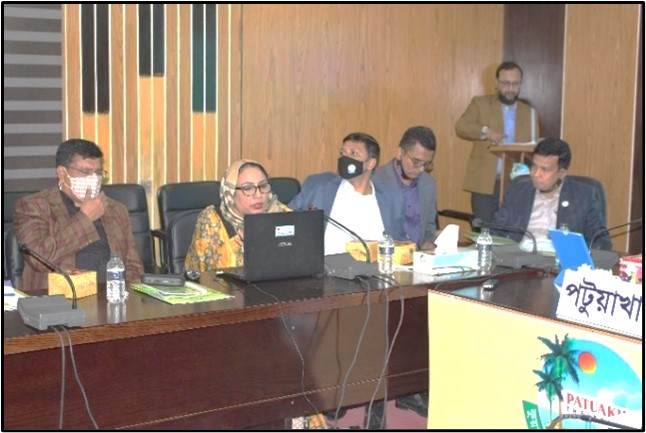 Mr. Mohammad Shamim Alam, Deputy Commissioner, Kishoreganj and Mr. Mohammad Kamal Hossen, Deputy Commissioner, Patuakhali attended the workshop as Chief Guest for the respective districts. In the Kishorganj district Mr. Md. Mostak Sarker, Additional Superintend of Police, Kishoreganj attended as Special Guest. Mr. Md. Mahfuzar Rahman, Deputy Director (Deputy Secretary), CPTU, IMED, Ministry of Planning chaired both the workshops in Kishorganj and Patuakhali.
Mr. Mohammad Shamim Alam, Deputy Commissioner, Kishoreganj and Mr. Mohammad Kamal Hossen, Deputy Commissioner, Patuakhali attended the workshop as Chief Guest for the respective districts. In the Kishorganj district Mr. Md. Mostak Sarker, Additional Superintend of Police, Kishoreganj attended as Special Guest. Mr. Md. Mahfuzar Rahman, Deputy Director (Deputy Secretary), CPTU, IMED, Ministry of Planning chaired both the workshops in Kishorganj and Patuakhali.
After the inauguration session of the workshop Ms. Meher Afroze, Deputy Director (Program and Gender), Bangladesh Center for Communication Programs (BCCP) made a presentation on electronic government procurement (e-GP) incorporating main features of the procurement process and present achievement of e-GP implementation. Also, she shared the importance of Citizen Portal and citizen engagement.
Mr. Mohammad Shamim Alam, Deputy Commissioner, Kishoreganj expressed his happiness to attend the workshop. He said that “It is the responsibility of all of us to make e-GP more dynamic and easier. The benefits of e-GP are many. One of the priorities of the government is e-GP. All government services are being digitized to make them easily accessible to the people. In this case CPTU is doing very well.”
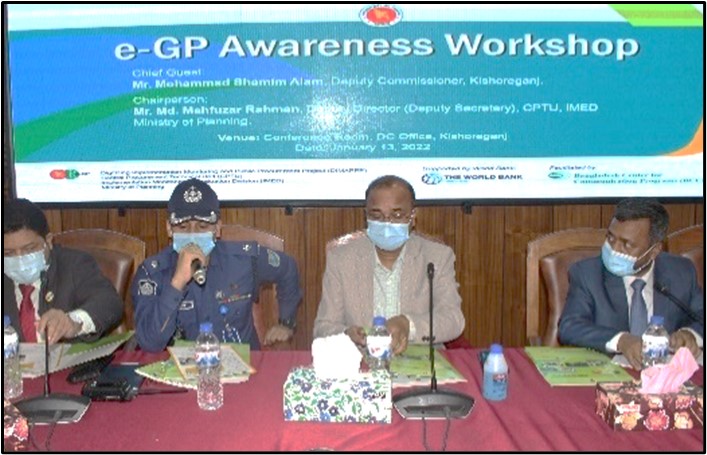 Mr. Mohammad Kamal Hossen, Deputy Commissioner, Patuakhali mentioned that “Development work should be corruption free for development of our country. For effective uses of e-GP system, change of our mindset is important. e-GP is a very simple and automated system for the public procurement. We just need to change our mindset and prioritize our ethical standard.”
Mr. Mohammad Kamal Hossen, Deputy Commissioner, Patuakhali mentioned that “Development work should be corruption free for development of our country. For effective uses of e-GP system, change of our mindset is important. e-GP is a very simple and automated system for the public procurement. We just need to change our mindset and prioritize our ethical standard.”
At the end of the workshops the open discussion was an interactive and useful part of the workshop. The floor was open to all the participants which allowed questions to be asked and answered and views to be exchanged. Mr. Md. Mahfuzar Rahman, Deputy Director (Deputy Secretary), CPTU, IMED, Ministry of Planning facilitated the session. The main goal of this session was to get participant’s feedback to know what problems they are facing for implementation of e-GP procurement.
It has been observed that the participants of “e-GP Awareness Workshop” were very active and eager to share their feedback, recommendations, and suggestions. It is hoped that information from the workshop participants will ultimately benefit the public procurement system.
In this training, there are many things to learn.
- Mr. Md. Rabiul Islam, Executive Engineer, 𝐋𝐆𝐄𝐃, Ukhiya-Cox’s Bazar.
𝐂𝐨𝐦𝐦𝐮𝐧𝐢𝐜𝐚𝐭𝐢𝐨𝐧 𝐚𝐧𝐝 𝐂𝐨𝐦𝐦𝐮𝐧𝐢𝐭𝐲 𝐌𝐨𝐛𝐢𝐥𝐢𝐳𝐚𝐭𝐢𝐨𝐧 𝐭𝐫𝐚𝐢𝐧𝐢𝐧𝐠 𝐟𝐨𝐫 𝐄𝐦𝐞𝐫𝐠𝐞𝐧𝐜𝐲 𝐌𝐮𝐥𝐭𝐢-𝐒𝐞𝐜𝐭𝐨𝐫 𝐑𝐨𝐡𝐢𝐧𝐠𝐲𝐚 𝐂𝐫𝐢𝐬𝐢𝐬 𝐑𝐞𝐬𝐩𝐨𝐧𝐬𝐞 𝐏𝐫𝐨𝐣𝐞𝐜𝐭 (𝐄𝐌𝐂𝐑𝐏) 𝐩𝐚𝐫𝐭𝐧𝐞𝐫𝐬 𝐚𝐧𝐝 𝐬𝐭𝐚𝐤𝐞𝐡𝐨𝐥𝐝𝐞𝐫𝐬
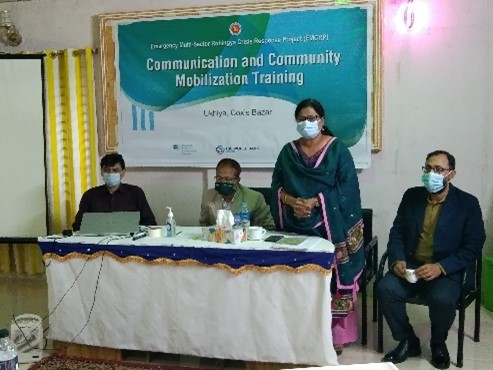 𝐁𝐂𝐂𝐏 has been implementing a multi-year awareness program for the 𝐄𝐌𝐂𝐑 project under LGRD and funded by the World Bank. Under this project, BCCP is conducting multifarious training and awareness activities. Currently, a series of two days Communication and Community Mobilization Training courses have been completed for the staff members of project partners and stakeholders who are working with Displaced Rohingya People and the host community at Ukhiya and Teknaf Upazilas.
𝐁𝐂𝐂𝐏 has been implementing a multi-year awareness program for the 𝐄𝐌𝐂𝐑 project under LGRD and funded by the World Bank. Under this project, BCCP is conducting multifarious training and awareness activities. Currently, a series of two days Communication and Community Mobilization Training courses have been completed for the staff members of project partners and stakeholders who are working with Displaced Rohingya People and the host community at Ukhiya and Teknaf Upazilas.
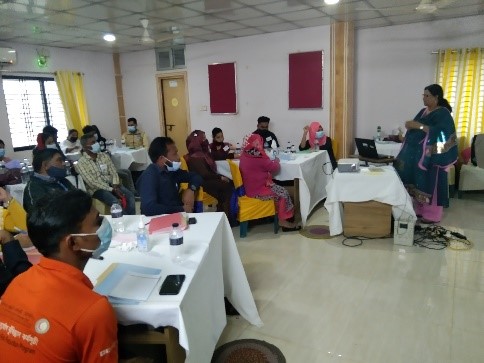 The training program aims to enhance knowledge and capacity of the participants on communication, awareness, and community mobilization; enhance their capacity for planning and implementing local level community mobilization programs on WASH practice, social and service system, disaster warnings and preparedness etc.
Mr. Md. Rabiul Islam, Executive Engineer, 𝐋𝐆𝐄𝐃 was present as the Chief Guest for all the opening ceremonies of 7 batches training. In the opening ceremony of last batch Mr. Md. Rabiul Islam mentioned that he observed some training sessions and found many things to learn from this training. He hopes this training will contribute a lot to the participants to conduct communication related activities.
The training program aims to enhance knowledge and capacity of the participants on communication, awareness, and community mobilization; enhance their capacity for planning and implementing local level community mobilization programs on WASH practice, social and service system, disaster warnings and preparedness etc.
Mr. Md. Rabiul Islam, Executive Engineer, 𝐋𝐆𝐄𝐃 was present as the Chief Guest for all the opening ceremonies of 7 batches training. In the opening ceremony of last batch Mr. Md. Rabiul Islam mentioned that he observed some training sessions and found many things to learn from this training. He hopes this training will contribute a lot to the participants to conduct communication related activities.
In first batch Mr. Md. Ruhul Amin, Deputy Director, Cyclone Preparedness Program (CPP) was the chief guest for closing ceremony. While Arif Hossain, Upazila Engineer, LGED, Teknaf was the chief guest for closing ceremony of last batch. A total of thirty participants attended each batch of training and total 7 batches training were conducted during January to February 2022.
Participants were also overwhelmed, some of their verbatims were as below:
𝐈 𝐡𝐚𝐯𝐞 𝐧𝐞𝐯𝐞𝐫 𝐫𝐞𝐜𝐞𝐢𝐯𝐞𝐝 𝐭𝐡𝐢𝐬 𝐭𝐲𝐩𝐞 𝐨𝐟 𝐭𝐫𝐚𝐢𝐧𝐢𝐧𝐠; 𝐭𝐡𝐢𝐬 𝐰𝐢𝐥𝐥 𝐛𝐞 𝐯𝐞𝐫𝐲 𝐮𝐬𝐞𝐟𝐮𝐥 𝐟𝐨𝐫 𝐦𝐞 𝐰𝐡𝐞𝐫𝐞𝐯𝐞𝐫 𝐈 𝐰𝐨𝐫𝐤.
Ms. Bipasha Chakma, Supervisor, PHD
https://www.facebook.com/CCPBangladesh/videos/902812543733165
𝐓𝐡𝐞 𝐢𝐧𝐜𝐥𝐮𝐬𝐢𝐨𝐧 𝐨𝐟 𝐭𝐡𝐞 𝐈𝐂𝐓 𝐩𝐚𝐫𝐭 (𝐒𝐨𝐜𝐢𝐚𝐥 𝐌𝐞𝐝𝐢𝐚) 𝐰𝐚𝐬 𝐯𝐞𝐫𝐲 𝐚𝐩𝐩𝐫𝐨𝐩𝐫𝐢𝐚𝐭𝐞 𝐟𝐨𝐫 𝐭𝐡𝐢𝐬 𝐭𝐫𝐚𝐢𝐧𝐢𝐧𝐠.
Mr. Sk. Mokammel Hossain, Field Coordinator, RTMI
https://www.facebook.com/CCPBangladesh/videos/1081588535957797
𝐈 𝐡𝐚𝐯𝐞 𝐥𝐞𝐚𝐫𝐧𝐞𝐝 𝐡𝐨𝐰 𝐜𝐨𝐦𝐦𝐮𝐧𝐢𝐜𝐚𝐭𝐢𝐨𝐧 𝐜𝐨𝐮𝐥𝐝 𝐛𝐞 𝐞𝐟𝐟𝐞𝐜𝐭𝐢𝐯𝐞 𝐟𝐫𝐨𝐦 𝐭𝐡𝐢𝐬 𝐭𝐫𝐚𝐢𝐧𝐢𝐧𝐠.
Ms. Oporajita Miching, Supervisor, PHD
https://www.facebook.com/CCPBangladesh/videos/674070603736458
Community Empowerment and Ownership will have Attained Through an Effective Community Mobilization Process
Bangladesh Training and Research Foundation (BTRF) had organized a 3-day course on the “Community Mobilization: Community Engagement” held on February 26-28, 2022 in the Multipurpose hall of BCCP. A total of 16 participants represents the Action Against Hunger Bangladesh/ACF Bangladesh, 7 Streams Foundation and Bangladesh Center for Communication Programs (BCCP) attended the course. Most experienced facilitators having 20 plus years of experiences have facilitated the course under a comprehensive curriculum designed with a set of combined methodologies. The set of combined methodologies followed the Reflection, Discussion and Synthesis (RDS) theory that brought a learning environment in the training course includes:
- Plenary discussion and presentation
- Question-answer and brainstorming
- Group exercise with group discussion
- Case study and role plays
- Group work presentation and receive feedback from the plenary session
- Display of learning video clips related to certain topics of the course
- Storytelling, experience sharing and energizers
- Sharing of success stories on community mobilization.
The application of the combined form of course methodologies found well accepted by the participants and their interest towards pro-active participation brought a real sense of learning environment in this three-day course. It had also brought a unique form of experiential learning while participants took part in different group and plenary discussions to share their idea, thoughts, and experiences. The whole sessions of the course were divided with a blend of didactic, reflection, simulation and synthesis form of application having approximately 40% as didactic, 30% as reflection, discussion & synthesis, and rest 30% as simulation.
At the end part of course related sessions with discussion, presentation, and group exercises; an action plan was developed by the participants based on their own project and work field following a prescribed action planning format. Participants were asked to fill out the format with their existing and upcoming plan for community mobilization activities following the learnings attained from this course.
Two separate course evaluations were conducted as first one was to obtain participants understanding and learnings about their level of knowledge and skills gained from this course and the other one was to know about their level of and ratings on the satisfaction over the quality of training, physical facilities and on their recommendations over the contents of the course.
The group wise evaluations over obtaining participants understanding about their level of knowledge and skills gained from this course have been expressed in an imaginary way through a body mapping process about what did they have learned which they will brought to the community expressing through the different parts of the human body.
In respect to the level of and ratings on the satisfaction over the quality of training, physical facilities and on their recommendations over the quality of contents of the training course, it has been found that out of the scale of 1-10 points to rate 1 as least and 10 as excellent, the average ratings were found at 8.38.
Enthusiasm and proactive participation marked the three days training on “Community mobilization and Community Engagement” course. Under the auspices of Bangladesh Training and Research Foundation (BTRF), the 3-day course on “Community mobilization and Community Engagement” continued with the great level of enthusiasm and proactive participation of the learners for the three days of the event.
A Brief on Impact Evaluation of Awareness Campaign Activities of Renewable Energy and Energy Efficiency Programme (REEEP) II
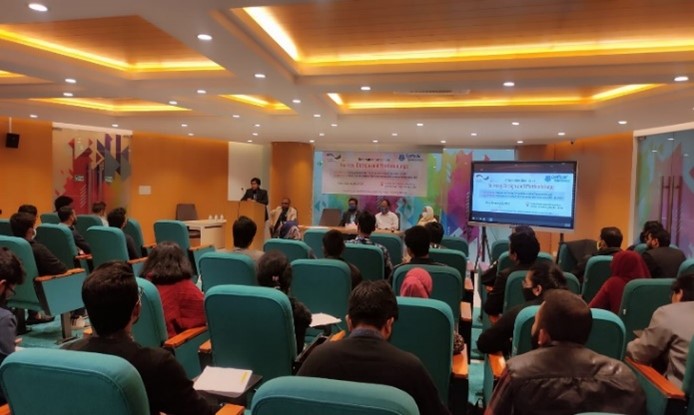 Bangladesh Center for Communication Programs (BCCP) signed a contract on December 23, 2021 with The Deutsche Gesellschaft für Internationale Zusammenarbeit (GIZ) GmbH to provide technical assistance to a national survey on the impact of awareness campaign activities conducted under the leadership of SREDA.
Bangladesh Center for Communication Programs (BCCP) signed a contract on December 23, 2021 with The Deutsche Gesellschaft für Internationale Zusammenarbeit (GIZ) GmbH to provide technical assistance to a national survey on the impact of awareness campaign activities conducted under the leadership of SREDA.
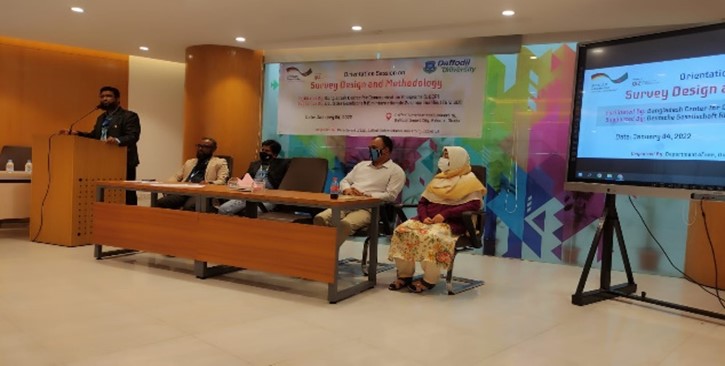 REEEP II is a bilateral technical cooperation project between the German and the Bangladesh Government, supported by the Bangladesh Ministry of Power, Energy and Mineral Resources (MPEMR) and implemented by GIZ. During implementation, REEEP II provided technical support to SREDA in developing a National Energy Efficiency and Conservation Awareness Campaign Concept and in designing and carry out several awareness activities nationwide.
The major activities conducted by BCCP were-
REEEP II is a bilateral technical cooperation project between the German and the Bangladesh Government, supported by the Bangladesh Ministry of Power, Energy and Mineral Resources (MPEMR) and implemented by GIZ. During implementation, REEEP II provided technical support to SREDA in developing a National Energy Efficiency and Conservation Awareness Campaign Concept and in designing and carry out several awareness activities nationwide.
The major activities conducted by BCCP were-
• Develop methodology and survey tools
• Conduct ODK software for online data collection
• Present methodology with SREDA and GIZ and incorporate feedback
• Conduct Workshop on Research Methodology for the EEE department students of Daffodil International University (DIU)
• Present study findings to GIZ and SREDA
• Submission of final report to GIZ
The BCCP research team; Professor Dr. M. Manzurul Hassan (Team Leader), H. M. Miraz Mahmud (Junior Expert), A B M Rasheduzzaman (Research Coordinator) and Zannatul Ferdous (Research Officer) successfully accomplished the work successfully. The final report was submitted to GIZ on March 30, 2022.
BCCP STAR OF THE MONTH

As a strategic communication organization, BCCP evaluates each staff in 360 degree each year. But to vibrate the best practices, BCCP started to appreciate the best performer of the month from July 2020 as “BCCP Star of the Month”. We are acknowledging all of them. Below is the three BCCP Star of the Month during January to March 2022.
Mr. Maien Uddin Sujan, Accounts Officer (BCCP Star of the month January 2022)
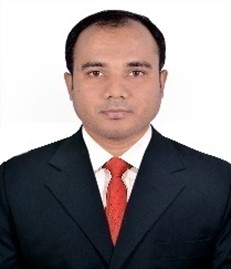 Mr. Maien Uddin Sujan, Accounts Officer of BCCP has established his image as a cordial, supportive and dependable staff member within the one year of his employment with BCCP. He can prepare & interpret financial statements according to company law & other corporate laws, guideline of International Financial Reporting Standard (IFRS)/International Accounting Standard (IAS), International Standards on Auditing (ISA), GAAP, notes to the accounts, ratio analysis and variance analysis & interpretation which is required for the management as well as for the Stakeholders. He completed Master of Business Studies (M.B.S) on Accounting from Dhaka College, Dhaka and attained 1st Class. He has completed a three years Chartered Accountancy Course and is registered as an Income Tax Practitioner under National Board of Revenue and a Member of Dhaka Taxes Bar Association.
Mr. Maien Uddin Sujan, Accounts Officer of BCCP has established his image as a cordial, supportive and dependable staff member within the one year of his employment with BCCP. He can prepare & interpret financial statements according to company law & other corporate laws, guideline of International Financial Reporting Standard (IFRS)/International Accounting Standard (IAS), International Standards on Auditing (ISA), GAAP, notes to the accounts, ratio analysis and variance analysis & interpretation which is required for the management as well as for the Stakeholders. He completed Master of Business Studies (M.B.S) on Accounting from Dhaka College, Dhaka and attained 1st Class. He has completed a three years Chartered Accountancy Course and is registered as an Income Tax Practitioner under National Board of Revenue and a Member of Dhaka Taxes Bar Association.
Ms. Farhana Beauty, Program Officer (BCCP Star of the month February 2022)
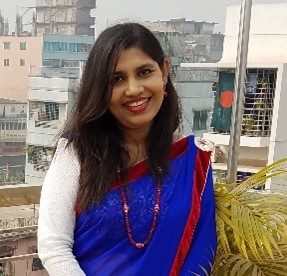 Ms. Farhana Beauty, Program Officer of BCCP has known as a sincere, responsible, and proactive team member. She has 16 years of experience working in the development sector of Bangladesh with different capacities mostly organizing different training programs/workshops/events for various government and non-government stakeholders both in rural and urban settings; developing and maintaining liaison with government & non-government stakeholders. She is experienced in conducting outreach activities including meeting with school teachers, parents gathering, cultural program, annual sports competition, art competition & exhibition. She worked to execute the eLearning courses under the Ujjiban project to enhance government field workers’ knowledge and skills. Being accommodative is her art and being loyal to the organization is her passion.
Ms. Farhana Beauty, Program Officer of BCCP has known as a sincere, responsible, and proactive team member. She has 16 years of experience working in the development sector of Bangladesh with different capacities mostly organizing different training programs/workshops/events for various government and non-government stakeholders both in rural and urban settings; developing and maintaining liaison with government & non-government stakeholders. She is experienced in conducting outreach activities including meeting with school teachers, parents gathering, cultural program, annual sports competition, art competition & exhibition. She worked to execute the eLearning courses under the Ujjiban project to enhance government field workers’ knowledge and skills. Being accommodative is her art and being loyal to the organization is her passion.
Mr. Md. Shahabuddin, Program Manager (BCCP Star of the month March 2022)
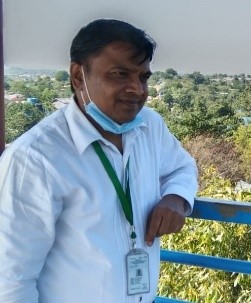 Mr. Md. Shahabuddin, Program Coordinator of BCCP is currently coordinating the Ukhiya field office of Cox’s Bazar under EMCRP-BCCP project. He is leading a local field team and implementing the field program in Rohingya Camps for the displaced Rohingya people and at Ukhiya & Teknaf for host community with close collaboration of LGED local officials and camp in charge (Executive Magistrate) CiC of Rohingya Camps. He has more than 19 years of working experience in implementing outreach activities, training, and local level field implementation activities for Adolescent Reproductive Health (ARH), Public Procurement Reform, Promoting Equality with Madrasa Student, Life Skills projects etc. Mr. Md. Shahabuddin is a hard-working person.
Mr. Md. Shahabuddin, Program Coordinator of BCCP is currently coordinating the Ukhiya field office of Cox’s Bazar under EMCRP-BCCP project. He is leading a local field team and implementing the field program in Rohingya Camps for the displaced Rohingya people and at Ukhiya & Teknaf for host community with close collaboration of LGED local officials and camp in charge (Executive Magistrate) CiC of Rohingya Camps. He has more than 19 years of working experience in implementing outreach activities, training, and local level field implementation activities for Adolescent Reproductive Health (ARH), Public Procurement Reform, Promoting Equality with Madrasa Student, Life Skills projects etc. Mr. Md. Shahabuddin is a hard-working person.
Editorial: Strategic Communication is synonymous to effective communication
As a communication organization, BCCP is continuing to inspire the audience to contribute to social development process and avail latest communication approaches in awareness raising programs. Sangjog has continuously been projecting various SBCC concept and issues to its readers. Since the scope and importance of strategic communication increased further in the 21st century, we hope the readers will get a comprehensive idea about public health and social development through this effort.
Participation of target audience is emphasized in strategic communication when it aims at changing behavior and that contributes to social development. While BCCP’s vision is to create an empowered and enlightened society, BCCP’s programs are designed to affect positive changes in the mindset of the people in terms of health, education, climate change or any other fields of social development.
To combat the challenges of the twenty-first century there is no alternative of using state-of-the-art approaches to effective communication process. When appropriate and effective strategic communication process is followed to achieve a specific goal, there is more possibility of attaining success in social development interventions that further emphasizes the importance of strategic communication.
As access to smart phones and the Internet has expanded over the past decade, so communication interventions need to incorporate new media channels, digital platforms and social media into social and behavior change communication (SBCC) efforts. Education-entertainment programming can tap into these urges and capitalize on multimodal, transmedia approaches to reach and engage with targeted group of people. The key is to understand audience interests and needs, their socioeconomic contexts, and their media and technology habits and preferences and to have a strong understanding of social and behavior change theories and practices following the process of strategic communication.
As a social development organization, BCCP believes in improving Strategic Communication capacity in a holistic manner, and as a part of its effort, BCCP offers various training and workshops to enhance organizational as well as individual capacity, including ‘Advances in Strategic Communication Workshop,’ which is being offered annually to develop future leaders in the field of Strategic Communication in Bangladesh. Since 1994, we have been offering this workshop to promote more effective, comprehensive and audience-centered SBCC programs via enhancing the capacity of the relevant program planners, designers, and implementers. The content and design of this workshop is being updated every year with the state-of-the-art tools and techniques.
We express our commitment to continue our Strategic Communication efforts in the future as well. We believe that our partners and well-wishers will be with us as in the past to support and encourage our endeavors.
Lancet Article
Scoop News: International Publications
Videos
BCCP PROMOTIONAL VIDEO


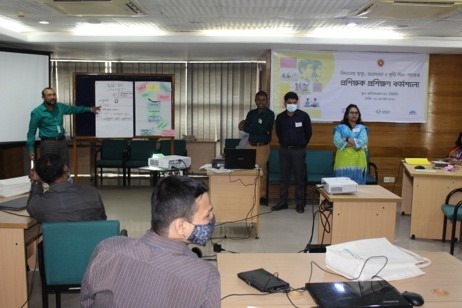 The whole gamut of the course went on with extended level of participation of the course participants. The effect of combined course methodologies was visible through the discussions, group work and group presentations. A wide range of enthusiasm and proactive engagements marked the event bringing a good level of learning environment in the training session.
The whole gamut of the course went on with extended level of participation of the course participants. The effect of combined course methodologies was visible through the discussions, group work and group presentations. A wide range of enthusiasm and proactive engagements marked the event bringing a good level of learning environment in the training session. 














